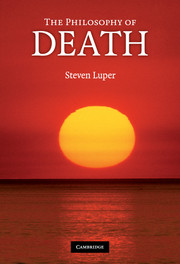5 - Mortal harm
Published online by Cambridge University Press: 05 June 2012
Summary
Epicurus thought that death and posthumous events cannot harm those who die. In part, he based his argument on the view that death leaves us immune to any genuine harm. In this chapter I will argue that he was incorrect. There is a straightforward kind of mortal harm: misfortune for which a person's death is responsible. Posthumous events, too, can be bad for people.
The first order of business will be to explain, in the first section, when things are in or against our personal interests. With this account in hand, I will show, in the second section, that death can harm those who die. Doubts will arise; I will sketch some of these, and see if they can be put away. Not until the next chapter will I consider Epicurus’ timing puzzle – the challenge of finding a time when death's victim incurs mortal harm.
PRUDENTIAL VALUE
Yesterday I got stuck in traffic on my drive home. Did this event harm me, benefit me, or neither? To answer this question, we will need a theory of prudential value: an analysis of welfare and of personal interests and how the one relates to the other. An account of welfare is an analysis of wellbeing; it tells us what well-being consists in, and how well off we are during a period of time or in some set of circumstances. An account of personal interests tells us what it is for something to be in our interests or against our interests.
- Type
- Chapter
- Information
- The Philosophy of Death , pp. 82 - 121Publisher: Cambridge University PressPrint publication year: 2009



